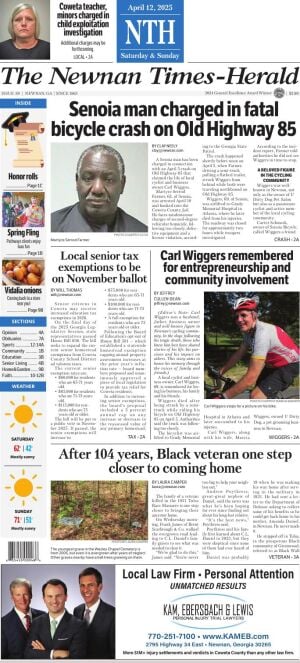A long-overlooked Newnan neighborhood, rich in African American history, is finally set for long-awaited renewal.
Backed by $4.6 million in federal funds, a Chalk Level housing rehabilitation project is set to bring long-term investment, homeownership opportunities and community-driven development to one of the city’s most culturally significant areas.
The project would include builds on the progressive improvements of the Howard Warner Community Center, Verona Rosser Center, sidewalks and culvert replacements that have occurred over the last 10 years.
Chalk Level is a historic African American neighborhood in downtown Newnan, bounded by the Farmer Street Cemetery and East Broad Street to the north, Landers Street to the south, Ball Street to the east and Thompson/ Wall Street to the west, nestled inside the railroad tracks.
Chalk Level traces its name to a white, chalk-like substance once found in the soil — a detail still recalled by some of the neighborhood’s oldest residents. Once home to generations of Black families, the neighborhood has endured cycles of disinvestment, storm damage and systemic barriers to homeownership.
Later this year, the Chalk Level historic designation nomination will be going before the state review board for their approval to submit at the national level — a long-anticipated move that affirms its cultural and historical importance to Newnan.
A federal boost for local families
Andrew Moody, special projects manager for the City of Newnan, said the revitalization project stems from a congressional spending allocation through the Department of Housing and Urban Development, secured in fiscal year 2023.
The $4.6 million grant will be split between two key efforts: rehabilitation of existing homes and constructing new affordable housing units.
Up to 25 homes will be rehabilitated under the city’s new program, modeled after the state’s CHIP (Community Home Investment Program), a state housing initiative funded by HUD’s HOME program.
Chalk Level homeowners who reside in their home and earn no more than 80 percent of the area median income will be eligible to apply for repairs — up to $40,000 per home — that address critical life-safety issues such as rotting floors, roof leaks, and failing windows.
Meanwhile, the city aims to build three new homes annually through 2031. Those homes will be leased for up to three years, with a portion of the rent placed in escrow that must be used as a down payment on the home to help tenants transition into ownership.
As homes are sold, the income cycles back into the program to build more homes, Moody said.
But Moody and community partners acknowledge the challenges ahead. Many homes in the area are tied up in probate or unclear ownership, and federal dollars require clear title to qualify for assistance. Others must vacate their homes during major renovations — yet federal funding does not cover relocation.
To fill the gap, churches and nonprofits are stepping in, offering temporary housing and legal aid.
“Some residents are willing, eligible, and approved — but have no family willing to house them during the rehab process,” said Luke Ayers of Hope Global.
“That’s where we step in — loading moving trucks, scheduling dumpsters and finding volunteers.”
In one case, an elderly woman unable to navigate her narrow hallway due to mobility issues had her home renovated with wider access, new cabinets, windows and fresh paint.
Bridging poverty to possibility
While the new homes are meant to be affordable, rising construction costs and income thresholds pose hurdles for some residents.
Homes on Murray Street, the city’s first round of new construction, are valued between $237,000 and $257,000. Applicants typically need a household income of at least $80,000 to qualify for a mortgage.
“It’s tough to admit that someone working at a local nonprofit or single-income household may not qualify,” said Ayers. “But the program is designed to help people build up to that over time.”
The Housing Authority, which manages tenant placement, includes financial counseling, credit-building education and life-skills development as part of the three-year leasing program. The goal is not just to fill homes, but to create capable, long-term homeowners.
In addition to housing, the city hopes to build pathways out of generational poverty. Through partnerships with West Georgia Technical College and WorkSource Georgia, residents will have access to workforce training and career advancement programs.
"Ideally, the goal would be to see them escalate income over a period of three years,” Moody said.
Local leaders also emphasized the importance of estate planning and probate education. Without clear wills or deeds, homes can fall into legal limbo when an owner passes away — contributing to neighborhood decline.
With the first round of applications for rehab expected this summer, and construction of new homes already underway, Chalk Level’s transformation is moving from vision to reality.








